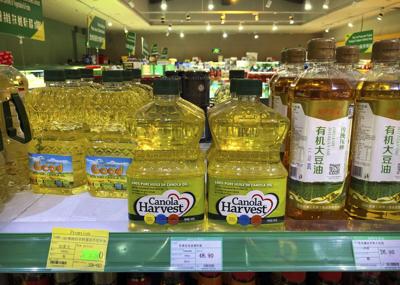Cracks are emerging in the Canadian national unity spurred by threats of U.S. annexation.
Tariffs on Canadian exports to the U.S. by Donald Trump, the U.S. president, have overshadowed damaging tariffs imposed by China on Canadian agricultural products.
Those combined trade disruptions with the world’s two largest economies are taking their toll on Canadian unity, a problem the next prime minister must address as a first order of business.
For instance, it’s possible that a sizable export tax on Canadian oil exports to the U.S., principally from Alberta, would be sufficient to force Trump to end his tariff war on Canada.
The U.S. relies on imported Canadian crude for about 20 per cent of its oil consumption. A sudden spike in U.S. oil prices from an export tax of, say, 300 per cent, would be a seismic shock for Americans.
That pain could be made still more severe by cutting off the oil exports altogether, a practice in which the U.S. has often engaged, such as the Biden administration’s restrictions on U.S. semiconductor exports to China.
But Alberta Premier Danielle Smith is emphatic in opposing any restrictions on the flow of Alberta oil and natural gas to the U.S.
Smith has threatened an ‚Äúunprecedented constitutional crisis‚ÄĚ if Ottawa dares meddle with Alberta‚Äôs energy exports.
Trump understands the importance to the U.S. of imported Canadian oil and gas. When Trump announced a 25 per cent tariff on most Canadian and Mexican imports on Feb. 1, he applied only a 10 per cent surtax on Canadian energy imports.
Trump’s tariffs have garnered most of the headlines. But Chinese tariffs imposed in March on Canadian agricultural products are also a threat to a unified Team Canada on the Prairies, in Atlantic Canada and in B.C.
Ottawa last October imposed a 100 per cent tariff on imported Chinese electric vehicles (EVs), and a 25 per tariff on Chinese steel and aluminum imports.
That was meant to protect the Ontario-based auto sector from a flood of cheap Chinese EVs.
Ottawa was also acting in lockstep with a Biden administration that earlier last year imposed 100 per cent tariffs on imported Chinese EVs and other Chinese goods.
China’s delayed retaliation to the Canadian tariffs came on March 8 with new tariffs on nearly $4-billion worth of Canadian agricultural imports.
China imposed a 100 per cent tariff on certain Canadian canola products and on peas, and 25 per cent tariffs on selected Canadian fish, seafood and pork products.
On canola products alone, Canadian farmers expect to take a $1-billion hit in lost sales and revenues.
Saskatchewan accounts for about half of that production. And its premier, Scott Moe, has been relentless in demanding that Ottawa revoke its trade sanctions against China.Őż
Roger Chevraux, an Alberta canola farmer and a director on the board of the Canadian Canola Growers Association, has said that Ottawa ‚Äúis quite willing to let the Canadian farmer be sacrificed like this and take a real hit.‚ÄĚ
That discontent ‚ÄĒ a sense that Central Canada‚Äôs auto industry is favoured over other regional economies¬†‚ÄĒ is evident in Atlantic Canada and B.C., as well.
Like Moe, B.C. Premier David Eby is a vocal critic of Canada’s tariffs on Chinese goods and the resulting Chinese retaliation.
Together with Trump‚Äôs tariffs on most Canadian goods, the targeted Chinese tariffs have ‚Äúeffectively cut off‚ÄĚ 83 per cent of Canada‚Äôs seafood markets worldwide, says the Fisheries Council of Canada.
Eby says the Canadian tariffs on China were imposed to ‚Äúcurry favour‚ÄĚ with a Biden administration that has come and gone.
China has incentive to lift its Canadian tariffs. China’s immense aquaculture industry relies on canola meal as feedstock. Canada is the largest external supplier of canola meal to China’s thousands of coastal fish farms.
Meanwhile, Chinese EV makers have shown no interest in the small Canadian EV market. Instead, they are focused on their enormous home market and Europe and Latin America.
Canada has many justified concerns about China, including its abysmal human rights record and evidence of Chinese interference in Canadian government.
In Canada‚Äôs necessary search for alternative markets to the U.S., Prime Minister Mark Carney said last week that ‚ÄúThere are partners in Asia with whom we can build deeper ties. But the partners in Asia that share our values don‚Äôt include China.‚ÄĚ
Fair enough.
But a new PM will have the task of coaxing Alberta into becoming a genuine member of Team Canada and supporting Canadian farmers and fishers by reaching a trade accommodation with China.
As it happens, China now seeks a restoration in Canada-China relations that almost led to a free-trade deal between the two countries in 2018.
That process of normalization could begin with a recognition that the Chinese market holds significant potential for increased Canadian exports.
And that the Canadian tariffs that so annoy China serve no purpose except to inflict hardship on Canadian farmers and fishers.




























To join the conversation set a first and last name in your user profile.
Sign in or register for free to join the Conversation